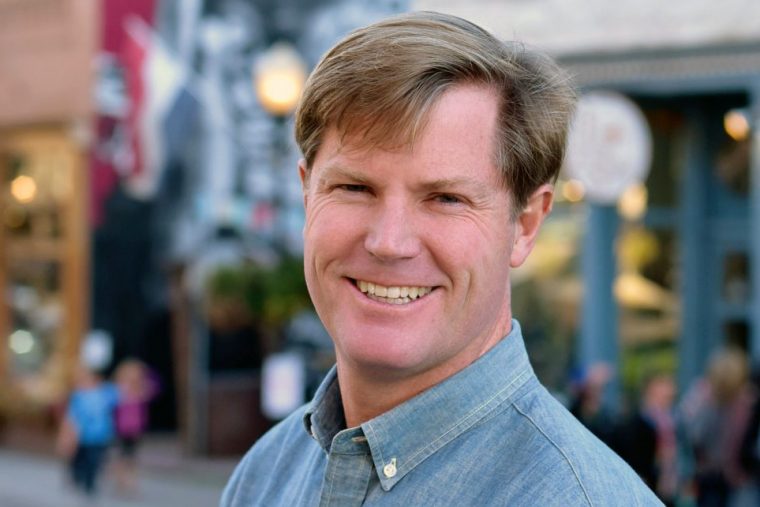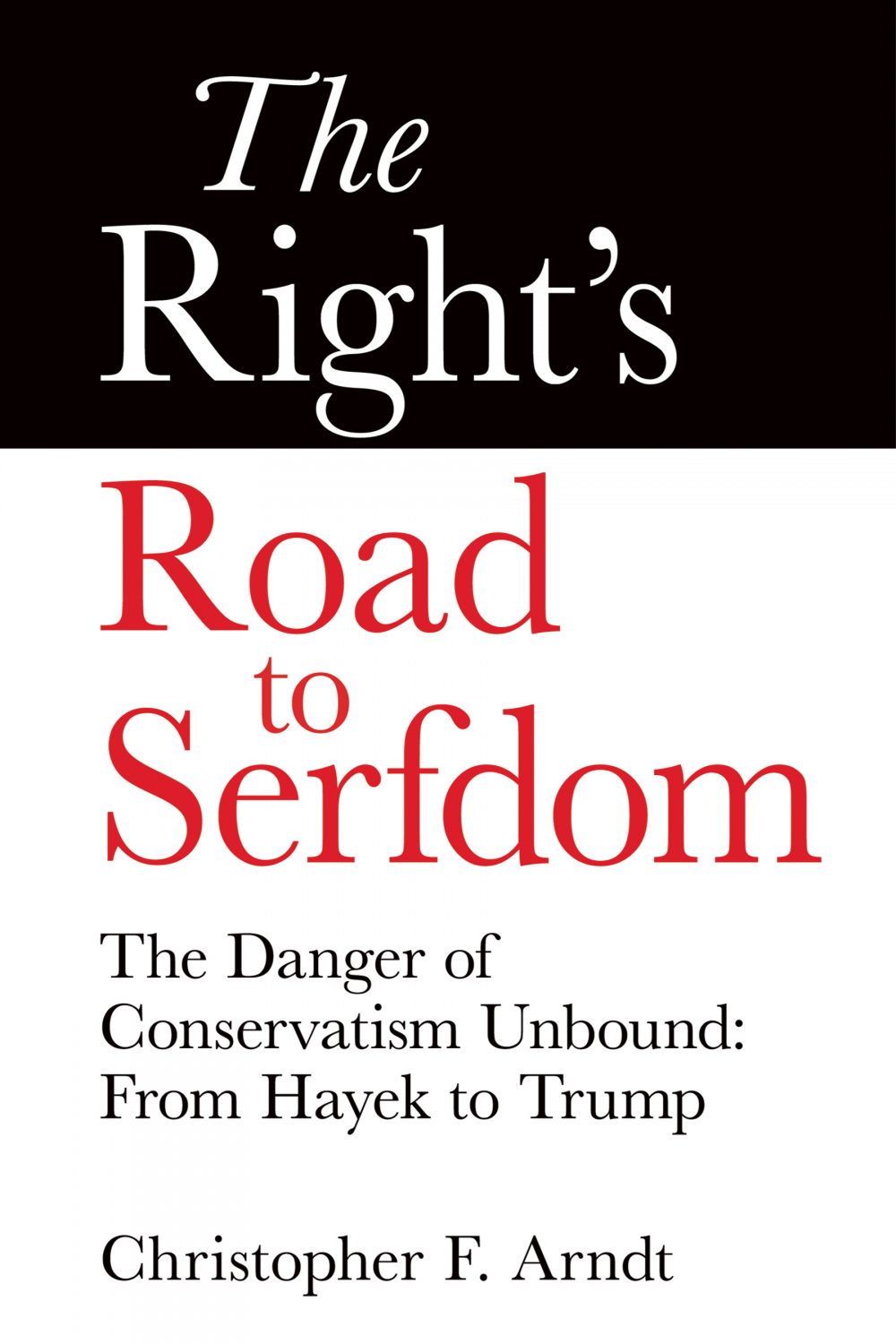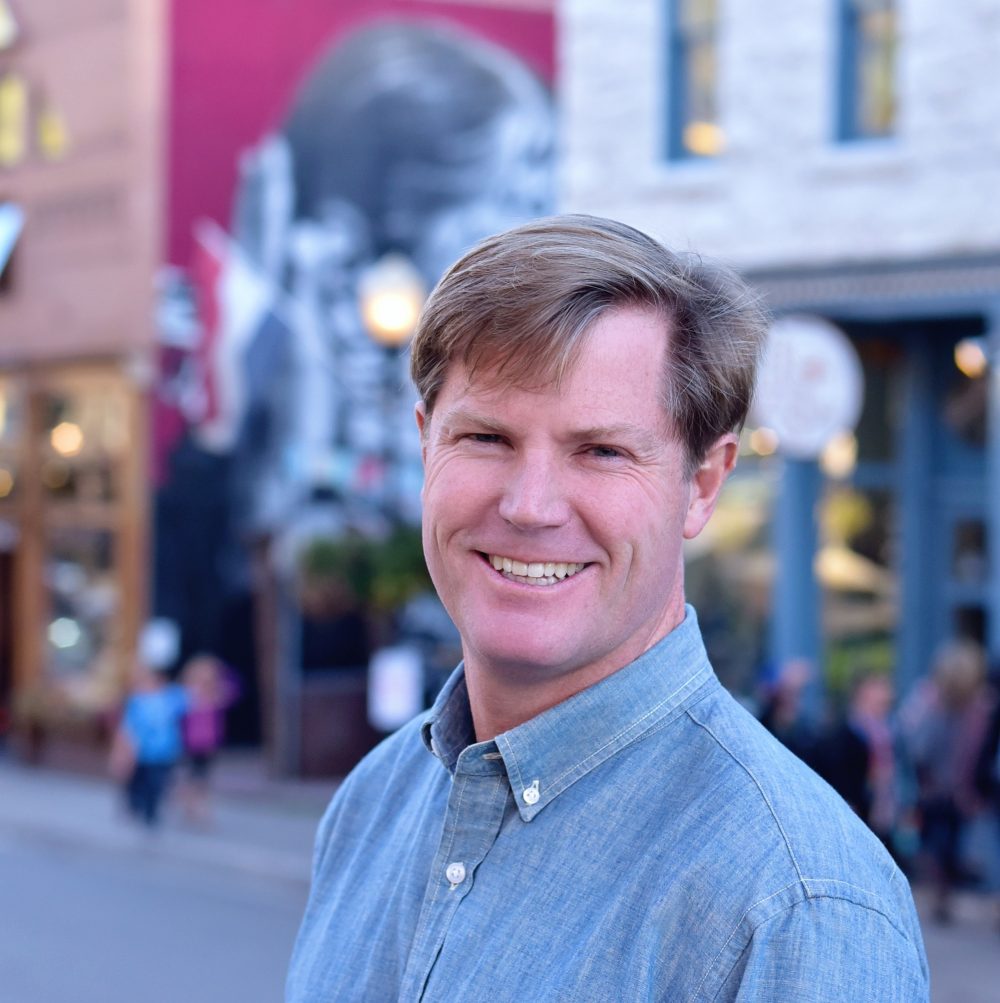New Book by Arndt ’92 Explores How the American Right Created Trump

 In The Right’s Road to Serfdom: The Danger of Conservatism Unbound: From Hayek to Trump (Bulkington Press, 2016), Christopher F. Arndt ‘92 argues that conservatism is not what it pretends to be and that the American Right created Donald Trump. “There’s a destructive logic that has led the so-called ‘Party of Liberty’ to nominate an authoritarian like Donald Trump as its leader,” says Arndt, a former Wall Street executive and portfolio manager, in the press materials for the book. “I wrote the book to explain how this happened—to offer a readable, yet substantive account of recent political developments and do so in the context of the principles of political freedom that are common to us all.”
In The Right’s Road to Serfdom: The Danger of Conservatism Unbound: From Hayek to Trump (Bulkington Press, 2016), Christopher F. Arndt ‘92 argues that conservatism is not what it pretends to be and that the American Right created Donald Trump. “There’s a destructive logic that has led the so-called ‘Party of Liberty’ to nominate an authoritarian like Donald Trump as its leader,” says Arndt, a former Wall Street executive and portfolio manager, in the press materials for the book. “I wrote the book to explain how this happened—to offer a readable, yet substantive account of recent political developments and do so in the context of the principles of political freedom that are common to us all.”
Below, News @ Wes talks with Arndt about the book, the subsequent election of Donald Trump, and the future.
What prompted you to write The Right’s Road to Serfdom?
There is a lot of confusion surrounding recent political developments, and in particular political developments on the American Right. I wrote the book to clarify recent events, to offer a warning, and also to serve as a timely reminder of the American ideal of Liberty. That’s a pretty general answer so let me provide an example:
In early September of 2016, the Dallas Morning News—a famously conservative newspaper—wrote an editorial urging its readership to reject Trump’s bid for the presidency. In doing so, the editorial writers of the paper noted that “Trump is—or has been—at odds with nearly every GOP ideal this newspaper holds dear.” That statement—like the piece overall—is striking, but the most remarkable and revealing part of the op-ed was the fact that in it they described Trump’s rise as inexplicable. That is, the opinion writers had no idea—no opinion—as to how Trump became the nominee of the GOP. They are not alone. There is a big void here. Across the political spectrum there still seems to be widespread confusion as to how an authoritarian personality like Trump became the leader of the “Party of Liberty.”
I wrote The Right’s Road to Serfdom because I felt like I had a clear, comprehensive answer to this important question. To be sure, there have been some excellent books about the American Right in recent years, but most dwell on the symptoms. I think my book gets to the underlying causes of how conservative extremism came to dominate the American Right of today. I tried to write the book in a way that’s sympathetic, readable and substantive.
What was the most surprising thing you learned when researching the book?
You find the best insights about the American Right—and perhaps the best insights about political developments of the last twenty years—from politicians and thought leaders who at one time or another were closely aligned with the conservative movement, but who eventually became estranged. In 2015 and 2016, some very well-known conservatives like George F. Will or well-known conservative publications like the National Review broke with Trump. But this discomfort with the direction of the American Right is not new. In my introduction, I discuss what I call a “quiet desperation on the American Right” that began in earnest during the Bush II years. Research on my book really began when I started to follow the books, writings and blog posts of these individuals closely in the mid-2000s. Trump is not an anomaly, he did not come out of nowhere. For example, as far back as 2006, you had a conservative writer complaining that “the causes that have been generating the real energy of the conservative movement of late” were things like “building walls to keep out immigrants.” That was 2006! In general, if you read my book, I think you will find that it is the observations of writers and leaders associated with the Right that are often the most striking, and most insightful.
Did writing the book provide an “ah-ha moment” that helped you better understand “the other side,” so that you could engage and discuss the issues you raise in the book?
In writing the book, I think I came away with a much better appreciation for how the American Right has been divided. I became much more sympathetic to a tradition on the Right that hues closely and earnestly to principles of political freedom. At the same time, I became much more critical and more aware of the danger of what is now the more dominant wing of the American Right—one that is driven by temperament, by a misguided idealism that is programmatically against government, and by special interest influence that cynically fuels that misguided idealism.
One critical insight is that there are two political traditions on the American Right. And, more importantly, these two traditions tend against each other. In short, there are two important sides to “the other side.” In 2016, some political observers started to call this out. For example, Ezra Klein of Vox started to draw a distinction between what he called “principled conservatism,” on the one hand, and a “resentful nationalism,” on the other. In my book, I try to be very clear about how these two traditions are different. To really understand what has happened to the American Right in the past twenty years, you need to keep this distinction in mind. The conflation of these two traditions in fact leads to confusion, and makes us more susceptible to what I call the Freedom Fraud.
I also gained a better appreciation of the American ideal of Liberty as I wrote the book. The first four chapters of the book broadly correspond to a discussion of four critical cornerstones of political freedom: 1) restraint and the rule of law; 2) pluralism; 3) facts common to all; 4) and a civilian controlled, defensive military. What was really gratifying in writing the book was gaining a better understanding of these principles—how they fit together. I also found that researching recent history in the context of these principles was illuminating. One word of related caution: Some readers, usually those that don’t follow politics closely, have found the first two chapters to be a little dense. But those same readers also say that there is a big payoff in chapters three through seven. I think the payoff comes as the all pieces start to fit together really well—better than I anticipated when I drew up an outline.

Can you explain what you mean by “freedom fraud”?
“Freedom fraud” is using the rhetoric of freedom to undermine political freedom and undermine civil society. It’s using the language of freedom for the purpose of promoting narrow industry or political interests over broad principles.
The most vivid illustration is the programmatically anti-government “freedom” rhetoric manufactured by large corporations, most often corporations that are prone to pollution or fraud such as fossil fuel and tobacco interests. A market economy works much better when fraud is effectively deterred or when pollution is curbed. Often these companies have tried to avoid being held accountable by selling a philosophy that less government always means more freedom, and this is always better. They are fighting regulations, but they are doing so under the guise of freedom. People have a much harder time coming to grips with this corruption of inactive government, but it’s a huge force in our politics today. I call it out for what it is—a freedom fraud.
The really acute problem is that this overt fraud becomes mixed together with a misguided idealism, what some have called free market fundamentalism, where government is always the problem and indiscriminately rolling it back is always the answer. It’s impossible to know where this overt fraud and this misguided idealism begin and end—often they are blended together—but the net result is a kind of “Jihad” against government leads to greater partisanship and an inability of government to function, particularly at the federal level.
For example, if you run for Congress on the Right today and organize your campaign around the evil of government and those on the other side that promote “activist” government, what do you do once you win office? Strike up a new piece of bipartisan legislation? You can’t do that. That’s the ticket to a primary challenge less than two years away. Your rhetoric has boxed you into a corner. So the focus then moves away from solving practical problems where government should be applied to stoking more fear about government or one’s political opponent or emphasizing an external menace (racial or foreign) or cultural difference (selling what I call conservative temperament as political freedom).
There’s a big irony here: The philosophy that is habitually against government leads not to government that is limited, but to politics that is unlimited. Moreover, as legislating becomes more difficult and as each year passes with congressional approval at record lows below 20 percent, the appeal for an outside authoritarian hand to come in and solve the mess alone is greatly strengthened. And this was an important dynamic that propelled Trump. For example, an April 5, 2016, Quinnipiac University survey titled “Trump Supporters Want Leader Who Ignores the Rules” captures this sentiment well. In the survey, 90 percent of Trump supporters agreed with the statement “What we need is a leader who is willing to say or do anything to solve America’s problems” (66 percent agreed strongly). By the survey, more than half of Americans agreed with the statement. So, that’s a very abbreviated explanation of the freedom fraud and the road to Trump.
Let me be clear. There are no angels in politics. Partisanship exists on both the Left and the Right. But the misguided idealism that is programmatically against government exists mostly on the Right today. This misguided idealism is a strong force in our politics today and it creates enormous collateral damage.
What was your reaction to the outcome of the 2016 presidential election? Were you as surprised as the rest of us—or did part of you think, because you had already written the book, I knew this could happen?
I wrote the book as a warning. When I started writing in September of 2015 I thought Trump’s chances to be the Republican nominee were much greater than others were giving him credit for. That part I got right. When I finished the manuscript in June of 2016, I thought we were on a disconcerting path, but I still thought Hillary Clinton might win in the general election affording more time for a course correction. As the summer past, and the race tightened in September it became clear that pretty much anything could happen. To be clear, on election night I still thought Hillary Clinton had an edge, but I think I was a lot less surprised than others.
With so many people focused on the worst case scenario with Donald Trump in the White House, what, for you, would be the best case scenario? What does Trump need to do—or Republicans in general need to do—in order for that to happen? And what do we all need to do in order to come together to bridge the divide?
Going forward, there is a very wide range of possible outcomes, both negative and positive. Clearly, Trump has authoritarian tendencies, but so much depends on how engaged people become and how people respond when political principles that are common to all are clearly threatened. A very strong immune response could ultimately lead to a healthier patient, if that makes sense.
The last chapter of my book is about recovery. I think knocking down the claim that government is always the problem—and that being “anti-government” is akin to being “pro-freedom”—is critical to bipartisan cooperation and our ability to govern. I’m a big fan of the dynamism of the private sector. And surely, government can overstep its bounds. But we need government to solve certain tasks. If we think more earnestly and clearly about where government reinforces political freedom, where it is essentially neutral to political freedom, and where it threatens freedom, we diffuse some of the fear-soaked partisanship, open up areas for constructive engagement, and at least better define the areas where we can agree to disagree.

